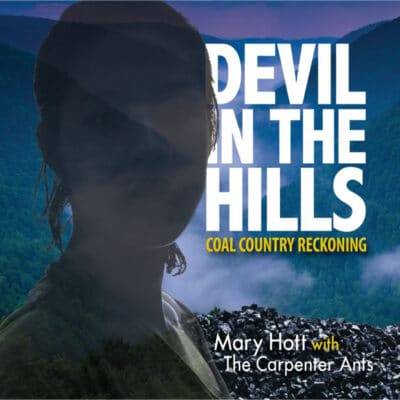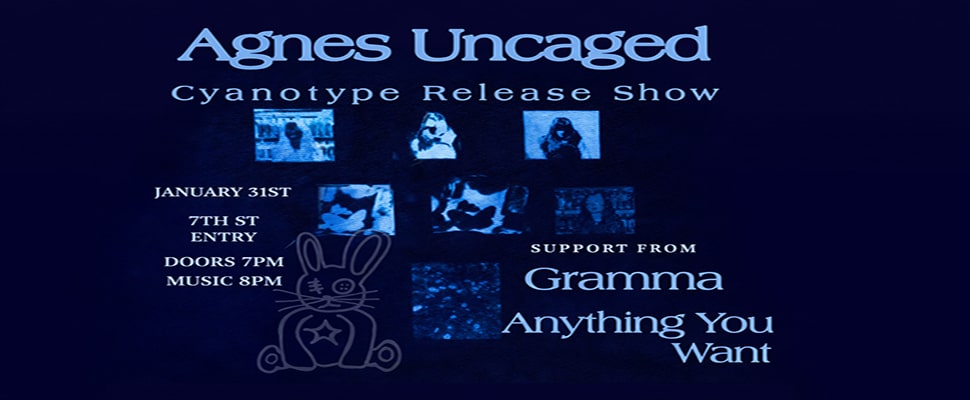Mary Hott with The Carpenter Ants Devil in the Hills – Coal Country Reckoning
 Mary Hott with The Carpenter Ants
Devil in the Hills – Coal Country Reckoning
Self-released
You may be thinking that The Carpenter Ants may not be the most inviting band name, but this is as an important concept album as you’ll find. Singer-songwriter Mary Hott is a seventh generation West Virginian who has devotedly researched since 2015 to make this album which reveals the untold brutal truths of the mine wars – caste-like oppression, sexual mistreatment of young women, and disguised slavery of the mine workers. Hott has a singing career that ranges from post punk to big band jazz as well as having studied piano at Berklee College of Music and blues harmonica with Jim Fitting. So, she knows her way around a tune. Here, though, the emphasis is not how she sings but what she is singing about. It’s not for the faint of heart.
The album is co-produced by Don Dixon, the indie-rock producer and Michael Lipton (long-time Mountain Stage house band guitarist and songwriter in The Carpenter Ants – The American/Gospel Charleston WV-based band that served as the album’s studio musicians. Anger over what happened to young women and girls as well as a personal incident in her youth compelled her to tell these harrowing stories.
The album begins with spoken words first told to Whipple Company Store & Museum owner Joy Lynn and from the book Whipple Company Store, Vol. 1, Coal Camp Voices, by Joyanfaith. “Everything the men worked for was taken from them in buildings like this one. No history book, readin or writin will learn ya the feelins, hurtin, painin and healin these here walls aholdin. These here hearts and minds of the people will be tellin ya the history if ya let ‘em.” In “They Built a Railroad,” an animated country song written by Hott and Lipton, we get a further sense of industry domination – “They carried works from Ellis Island. They brought freed slaves to work the mines. They trafficked girls for comfort and pleasure. Total power over humankind.” In the Celtic-tinged ballad “Annabelle Lee” Hott sings of a poverty-stricken family renting their 12-year-old daughter to coal company agents seeking “comfort girls” for company managers. “Take the Esau” tells of women exploited for sex in exchange for keeping their families fed if a husband was injured or killed in the mines.
Hott wrote or co-wrote all the songs except the gospel hymn “Life’s Railway to Heaven,” “Blair Mountain Ballad” and a searing gospel, impeccably phrased interpretation of the closing “Take Me Home, Country Roads.” The music ranges from folk to country to funk and blues, the latter heard in the anthem “Rise Up, WV.” There is a detailed 24-page booklet that contains the lyrics and stories behind the songs. Aa an example, on the later, this appears – “…The traumatic stories shared by the people of the coal camps expose the historic oppression that resides in the collective consciousness of the Mountain State. These deep soul wounds have passed on through generations.” And later, speaking about the song – “… is not a shout for revolt, but rather a call to acknowledge our past and rise above the wounds to break the cycle of intergenerational trauma. Even if our families never had these experiences, we should all want to see each and every one of us rise above.
Much of the inspiration for this comes from the aforementioned book which chronicles stories told to Lynn from former coal camp residents who’d been children in the early 20th century. These are published in the books Coal Camp Voices and Life in the Shadows. Hott says this, “The mine bosses constantly cheated the miners. The miners’ wages went back to the company as rent for housing and whatever else they earned went to the company store for food and other necessities. And the coal companies hired mine guards to stop the miners from unionizing. It was slave labor, but they figured out how not to call it slavery.”
Hott is simply not making an album, she is championing the cause. She will launch a national campaign for Devil in the Hills during the 100th anniversary year of the Battle of Blair Mountain. In the late summer of 1921, 10,00 union miners battled an army of 3,000 state police officers, deputies and militiamen. The fighting didn’t end until federal troops arrived.
Hott reveals a history that many wanted kept hidden. She and band strongly deliver the music as the well-worn cliché says, as a healing force. In this case the healing is so sorely needed.
Mary Hott with The Carpenter Ants
Devil in the Hills – Coal Country Reckoning
Self-released
You may be thinking that The Carpenter Ants may not be the most inviting band name, but this is as an important concept album as you’ll find. Singer-songwriter Mary Hott is a seventh generation West Virginian who has devotedly researched since 2015 to make this album which reveals the untold brutal truths of the mine wars – caste-like oppression, sexual mistreatment of young women, and disguised slavery of the mine workers. Hott has a singing career that ranges from post punk to big band jazz as well as having studied piano at Berklee College of Music and blues harmonica with Jim Fitting. So, she knows her way around a tune. Here, though, the emphasis is not how she sings but what she is singing about. It’s not for the faint of heart.
The album is co-produced by Don Dixon, the indie-rock producer and Michael Lipton (long-time Mountain Stage house band guitarist and songwriter in The Carpenter Ants – The American/Gospel Charleston WV-based band that served as the album’s studio musicians. Anger over what happened to young women and girls as well as a personal incident in her youth compelled her to tell these harrowing stories.
The album begins with spoken words first told to Whipple Company Store & Museum owner Joy Lynn and from the book Whipple Company Store, Vol. 1, Coal Camp Voices, by Joyanfaith. “Everything the men worked for was taken from them in buildings like this one. No history book, readin or writin will learn ya the feelins, hurtin, painin and healin these here walls aholdin. These here hearts and minds of the people will be tellin ya the history if ya let ‘em.” In “They Built a Railroad,” an animated country song written by Hott and Lipton, we get a further sense of industry domination – “They carried works from Ellis Island. They brought freed slaves to work the mines. They trafficked girls for comfort and pleasure. Total power over humankind.” In the Celtic-tinged ballad “Annabelle Lee” Hott sings of a poverty-stricken family renting their 12-year-old daughter to coal company agents seeking “comfort girls” for company managers. “Take the Esau” tells of women exploited for sex in exchange for keeping their families fed if a husband was injured or killed in the mines.
Hott wrote or co-wrote all the songs except the gospel hymn “Life’s Railway to Heaven,” “Blair Mountain Ballad” and a searing gospel, impeccably phrased interpretation of the closing “Take Me Home, Country Roads.” The music ranges from folk to country to funk and blues, the latter heard in the anthem “Rise Up, WV.” There is a detailed 24-page booklet that contains the lyrics and stories behind the songs. Aa an example, on the later, this appears – “…The traumatic stories shared by the people of the coal camps expose the historic oppression that resides in the collective consciousness of the Mountain State. These deep soul wounds have passed on through generations.” And later, speaking about the song – “… is not a shout for revolt, but rather a call to acknowledge our past and rise above the wounds to break the cycle of intergenerational trauma. Even if our families never had these experiences, we should all want to see each and every one of us rise above.
Much of the inspiration for this comes from the aforementioned book which chronicles stories told to Lynn from former coal camp residents who’d been children in the early 20th century. These are published in the books Coal Camp Voices and Life in the Shadows. Hott says this, “The mine bosses constantly cheated the miners. The miners’ wages went back to the company as rent for housing and whatever else they earned went to the company store for food and other necessities. And the coal companies hired mine guards to stop the miners from unionizing. It was slave labor, but they figured out how not to call it slavery.”
Hott is simply not making an album, she is championing the cause. She will launch a national campaign for Devil in the Hills during the 100th anniversary year of the Battle of Blair Mountain. In the late summer of 1921, 10,00 union miners battled an army of 3,000 state police officers, deputies and militiamen. The fighting didn’t end until federal troops arrived.
Hott reveals a history that many wanted kept hidden. She and band strongly deliver the music as the well-worn cliché says, as a healing force. In this case the healing is so sorely needed.
- Jim Hynes
Discover more from Making A Scene!
Subscribe to get the latest posts sent to your email.








